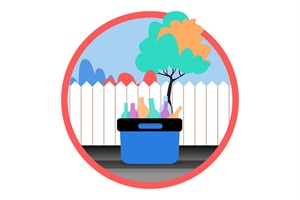Green light for kerbside recycling and food waste for Whanganui
Published on 11 November 2021

Whanganui District councillors have formally voted to adopt the council’s Waste Plan 2021 with minor amendments. The two big changes the waste plan will bring about are rates-funded kerbside recycling and food waste collections for urban Whanganui households.
Mayor Hamish McDouall said the adoption of the plan signals a change in direction for dealing with waste in Whanganui.
“With this decision, we’re putting a stake in the ground. I think it’s the right thing to do at the right time.
“Humanity has produced a culture of consumption and the end point of consumption is waste. We need to get into a different head space for dealing with waste, perhaps even starting by considering what we’re actually purchasing and bringing into our homes.”
He noted that, due to its volume, one of the key factors in the plan was construction waste. Councillors voted in favour of working with an organisation to establish services to collect, sort and divert as much construction and deconstruction waste as possible.
Mayor McDouall said one submitter mentioned the irony of the council’s deliberations occurring just at the tail end of the COP26 climate talks in Glasgow. He acknowledged Te Rūnanga o Tamaupoko and Te Rūnanga o Tupoho representatives’ point that the council’s waste plan needs to be tied in with its climate change strategy, and said during deliberations councillors had considered the “absolute climate imperatives which are evident right now”.
Councillor Alan Taylor, who chairs the council’s Infrastructure, Climate Change and Emergency Management Committee, commented that councillors had heard from a subset of the community but also needed to ask what the environment tells us.
“Are we looking at this whole problem through the eye of the wētā, and the eye of the kōkako, and the kererū? That’s just as important.”
Councillor Rob Vinsen, who chairs the council’s Waste Minimisation Advisory Group, said most local authorities in New Zealand provide a kerbside recycling service and he is pleased that in about 18 months’ time Whanganui households will have that service as well.
The kerbside recycling service is expected to operate weekly, with glass collected one week and paper, plastic, cardboard, cans and tins collected the following week.
“The decision to implement a food waste collection is a bit more contentious,” Cr Vinsen says, “as many households home compost.
“However, food waste in landfills contributes to climate change and central government has clearly indicated, in its national waste strategy, that dealing with food waste is an important action to take.”
Cr Vinsen says he expects that by 2024, when the kerbside food waste service is due to commence, central government will require councils to offer this option.
Each household will be issued with a small, closed container for food waste, to be collected weekly. Because it will be a commercial composting service, it will take food items that can’t go in home compost bins – like citrus, meat, fish and dairy products – as well as other items like vacuum cleaner dust and compostable packaging.
The rates increase – per urban household per week from 2023 – would be about $1.35 for kerbside recycling and about 76 cents for kerbside food waste.
Cr Vinsen says he is particularly pleased the council also voted to investigate an opt-in green waste collection for households.
“Currently private green waste collection is around ten to fifteen dollars per pick-up. Contrast this with the service introduced in Tauranga, where the cost is $95 for 26 pick-ups per year – that’s less than four dollars per pick up.
“Over 10 000 households have opted into the service in Tauranga, and I expect Whanganui households will be just as enthusiastic,” Cr Vinsen says.